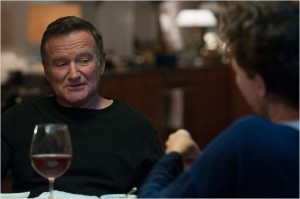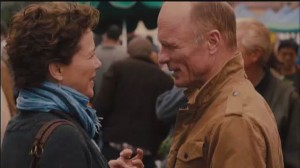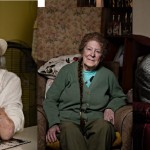Joyce Glasser reviews The Face of Love (December 12, 2014)
If there is a memorable, profound film lying beneath Arie Posin’s interesting and well-acted psychological drama, The Face of Love, it might be for another writer/director to unearth it.
From the cheesy opening scene at a Mexican beach resort, there is something about the style and tone of the film that is at odds with the premise’s psychological conceit.
Ed Harris and the wonderful Annette Bening – who is, quite literally, The Face of Love – are good enough to keep us watching, but their efforts are never enough to make the film a satisfying experience.
A nearly silent montage shows us a fifty-something couple who are madly in love. Interior designer Nikki (Bening) has had the perfect marriage to Garret (Harris), a handsome architect with whom she is enjoying a holiday in a Mexican resort.
You know it is too good to be true and sure enough, two minutes into the film, Tom drowns. Your first question is how? He is fit and there was no mention of a heart attack. It was not a shark (there is no blood), and riptides draw bodies out to sea; they do not deposit them conveniently on the sand in front of the hotel for a distraught Nikki to find.
 Five years later, Nikki is still drifting. Her neighbour Hoger (the late Robin Williams), has little hope of marrying Nikki, the secret object of his affection for years. Nikki does not even date. And she no longer goes to the Los Angeles Art Museum where she and Garret used to go.
Five years later, Nikki is still drifting. Her neighbour Hoger (the late Robin Williams), has little hope of marrying Nikki, the secret object of his affection for years. Nikki does not even date. And she no longer goes to the Los Angeles Art Museum where she and Garret used to go.
But one day, she summons up the courage to go in. In the garden, she sees a man who looks exactly like Garret. She returns to the museum until she sees him again and then stalks him. Nikki learns that he works at a university and she pays an awkward visit to his art class.
Inventing an excuse to see him again, Nikki enquires about private lessons, eventually inviting Tom over. Tom, intrigued and flattered, finds himself falling for this slightly strange, but passionate woman. Conveniently, Tom is divorced, and his ex-wife supports his art.
When Nikki and Garret’s only child, Summer (Jess Weixler), returns home without notice and sees Tom’s face, she becomes hysterical, ordering him to leave. Nikki asks her to leave instead and smoothes things over with Tom.
This incident, and the stress of trying to hide her lover from her social circle, eventually leads to cracks in the relationship. Half of Nikki is aware of her fantasy while the other half wants to seek comfort in the delusion. The dramatic climax comes when Nikki persuades Tom to join her for a romantic trip to the resort in Mexico where Garrett died.
 You do not have to be a budding Roger Ebert or Philip French to know that this is a takeoff on Hitchcock’s Vertigo, only in reverse, as it is the woman doing the fantasizing. Posin even sets their first meeting in an art museum – only in Vertigo it is not L.A., but San Francisco.
You do not have to be a budding Roger Ebert or Philip French to know that this is a takeoff on Hitchcock’s Vertigo, only in reverse, as it is the woman doing the fantasizing. Posin even sets their first meeting in an art museum – only in Vertigo it is not L.A., but San Francisco.
And then there is the late Robin Williams in his psychological thriller – as opposed to friendly comic – mode.
In One Hour Photo, Williams played a sad, lonely, photo technician who becomes dangerously obsessed with the happy family whose photos he develops.
In Christopher Nolan’s Insomnia, Williams plays a creepy crime writer who plays cat and mouse games with the detective as the prime suspect in the murder of a school girl.
Williams is in this ‘sinister creep’ mode throughout The Face of Love, spying on Nikki rather than simply looking out for her. He lurks around like a bottled-up explosion and you are always waiting for something to happen to explain or justify the character.
Despite the shades of Vertigo and Williams’ character, The Face of Love never manages to become a psychological thriller and the tone of the film clashes with our expectations. Instead, it is played out as a straightforward profile of bereavement at its most intense. That Bening pulls it off is a miracle.
 The film’s entertainment value is down to the chemistry between the leads and the skill of the cast. Bening, whose expressive eyes and face convey all of Nikki’s conflicted feelings, gets to the heart of her complex character, and her performance remains laudable, where it could so easily be laughable.
The film’s entertainment value is down to the chemistry between the leads and the skill of the cast. Bening, whose expressive eyes and face convey all of Nikki’s conflicted feelings, gets to the heart of her complex character, and her performance remains laudable, where it could so easily be laughable.
Harris, sexy, sincere, bemused, and increasingly wary, yet hopelessly seduced, is equally credible. That Harris’ Tom is so willing to go for it despite the warning signs is down to an all-too-convenient secret that he keeps from Nikki.
To Posin’s credit, he gives meaty, sexual roles to fifty-something actors who might otherwise find themselves playing the background mother and father respectively of children who are the stars of the film. You just wish that Posin had the vision and skill to match the performances and the film’s potential.




